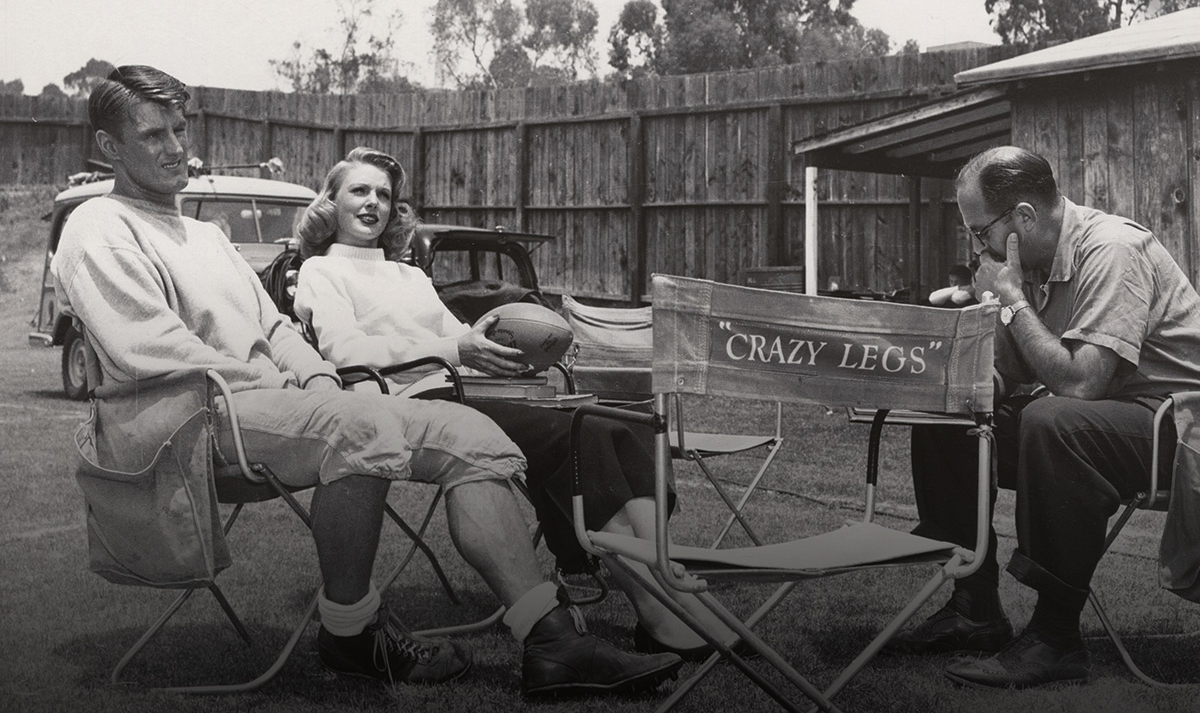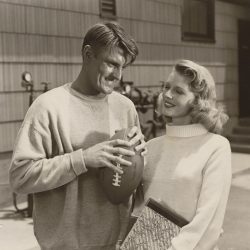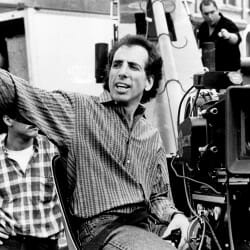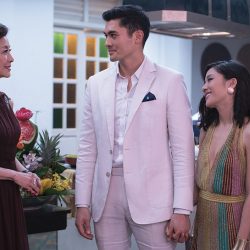
When Crazylegs Went Hollywood
Badger football star Elroy Hirsch found a second career in the movies
UW alumni know Elroy “Crazylegs” Hirsch x’45 as a football star who made his name — and earned his nickname — in just one season with the Badgers. Hirsch had a Hall of Fame pro career in Los Angeles, where he played nine seasons for the Rams and led the team to the NFL title. But he also made a name for himself in neighboring Hollywood, scoring credits long before former football players such as Alex Karras, Howie Long, and Michael Strahan made the move to the silver screen. Hirsch starred in three films, the last of which inspired a trio of UW alumni to make a classic considered among the best comedy films of all time.
Hirsch had good looks and a faint resemblance to Kirk Douglas, so it wasn’t surprising that movie producers came calling for him. There was already a tradition in Hollywood of casting college All-Americans and Heisman Trophy winners in their own biographical flicks, including Tom Harmon (Harmon of Michigan, 1941), Frankie Albert (The Spirit of Stanford, 1942), and Bruce Smith (Smith of Minnesota, 1942).
Naturally, Hirsch’s first film was a biopic, named simply Crazylegs for its star and the life story it told. The 1953 movie depicted Hirsch’s close relationship with his high school football coach from Wausau, Wisconsin, Win Brockmeyer (played by Lloyd Nolan), and his hometown sweetheart (and eventual wife), Ruth Stahmer (played by Joan Vohs). A must-see film only for diehard Wisconsin and LA Rams fans, Crazylegs was Hirsch’s favorite of his movies, because it featured actual footage from his college and pro playing days.

Hirsch played himself in the 1953 film based on his life story. Everett Collection, Inc./Alamy Stock Photo
Crazylegs contains rare film of Hirsch’s 1942 season with the Badgers, including his nickname-earning touchdown run at Soldier Field, which prompted a Chicago Daily News journalist to write, “Hirsch ran like a demented duck. His crazy legs were gyrating in six different directions all at the same time in the 61-yard touchdown run that cemented the win.” In that year, Hirsch took a squad that had a solid base of talent and led them to an 8–1–1 record, a level of excellence that Madison hadn’t seen in football since 1912.
“Hirsch as an actor is both likable and believable,” Los Angeles Times reviewer John L. Scott wrote. “He does very well in his first film assignment.” The Capital Times called the film “congenial.”
Crazylegs did fairly well at the box office, outperforming a new Marilyn Monroe flick, How to Marry a Millionaire, when it premiered in Milwaukee in time for the 1953 football season. Hirsch returned to Wausau for a screening in early November, and a big crowd came out to see the hometown hero in the flesh along with his wife and former coach.
Hirsch’s acting, while hardly Shakespearean, showed enough promise to win him the leading role in Unchained, a 1955 prison drama set in Chino, California. Hirsch, often shirtless, got some surprisingly decent reviews for his role as an angst-ridden convict torn between serving his time and busting out of the minimum-security prison that gives prisoners so much latitude that escape is a constant temptation.
His final movie role came in 1957 at the end of his playing career. Zero Hour! was a forerunner to 1970s disaster films such as Airport and The Towering Inferno. Hirsch played the pilot of an airliner already in the sky when an outbreak of virulent food poisoning strikes him, the copilot, and dozens of passengers. Who on the plane could possibly fly the commercial flight to safety? Fate points toward Ted Striker (Dana Andrews), a World War II pilot who has followed his estranged wife onto the plane in the hopes of reconciling. Unfortunately, Ted is haunted by a war tragedy in which much of his crew was killed due to his error at the stick. Not only are his nerves shot, but he hasn’t set foot in a plane, let alone a cockpit, for years.
If that plot sounds vaguely familiar, it’s because it was stolen, right down to the exclamation point in the movie’s title, by Jim Abrahams x’66 and the Zucker Brothers, David ’70 and Jerry ’72, for Airplane! — surely, one of the funniest movies ever written. (We are serious. And don’t call us Shirley.)
The three founding members of the comedy troupe Kentucky Fried Theater arrived in Los Angeles in 1972, after a year of performing in a space in the back of a Madison bookstore. They set up shop at a small theater on Pico Boulevard and began performing sketch comedy, just as they had in Madison, largely based on late-night television. They used an old-fashioned reel-to-reel machine to record the odd commercials and otherwise unseen movies that filled air time between Johnny Carson and the television test pattern. They would riff on the recording as it was shown on stage that night, inserting dialogue, spoofing circumstances, and cracking wise.
One morning, they arrived at the theater to find Zero Hour! on the tape.
“It was a jewel,” Abrahams says. “Overblown. Incredibly melodramatic. But a perfect three-act story. We were comic writers. We didn’t know how to write a narrative.”
The three were interested in parodying a full movie. On the morning that they discovered Zero Hour!, they thought, “This is it,” David Zucker says.
As Wisconsin natives, they knew about Hirsch and his legendary athletic career. But his presence in the movie was merely a bonus bit of trivia; they knew the movie’s structure and canned melodrama were ripe for parody.
They fashioned a script that hewed so closely to the original that ultimately, they wound up stealing not just the plot and premise, but also whole scenes of dialogue. To obviate copyright issues, they bought the remake rights to Zero Hour!
“Basically, we just recast the movie,” Zucker says. “Elroy Hirsch became Peter Graves. Dana Andrews’s Ted Striker became our Robert Hays’s Ted Striker.” Kareem Abdul-Jabbar, Leslie Nielsen, Robert Stack, Lloyd Bridges, and Leave It to Beaver’s Barbara Billingsley rounded out the cast. Made on a shoestring budget, Airplane! became the third-highest-grossing comedy in box office history after it came out in 1980.
For Hirsch, Zero Hour! was the end of his film career, but his connection to Hollywood briefly lingered. After his retirement from football, the Rams hired him as general manager in 1960, and he went on to make brief guest appearances on two network television sitcoms: The Bob Cummings Show and The Munsters. For the latter, he played himself in a storyline that had him considering using the big-footed Herman Munster as a punter for the Rams.
In 1969, Hirsch returned to Madison to become the UW’s athletic director and spent almost 20 years in the role. During that time, he hosted a radio show and a how-to sports television program sponsored by the Union Oil Company, for whom he worked as a spokesman.

Crazylegs ended his film career as a pilot under duress in Zero Hour! Everett Collection, Inc./Alamy Stock Photo
He died in 2004 at the age of 80, but he remains a legendary figure in Madison, known to many because of the Crazylegs Classic, the 8K annual race launched in 1982 to benefit university athletic programs.
What he thought of Airplane! or if he ever saw it is unknown, at least by the Zucker brothers and Abrahams. They never had a chance to meet Hirsch to ask.
For his part, Hirsch reminisced a bit about his Hollywood career following his UW retirement, noting it “was a heckuva break,” but not something he ever seriously considered pursuing as a profession.
“You really have no control over what you do. You sit at home and wait for the phone to ring,” he said in a 1987 interview. “I guess I was just never one for that kind of job insecurity.’’
Tim Brady ’79 is a freelance writer based in Saint Paul, Minnesota. He wrote about the early days of Wisconsin football for the Fall 2017 issue of On Wisconsin.
Published in the Fall 2018 issue





Comments
No comments posted yet.